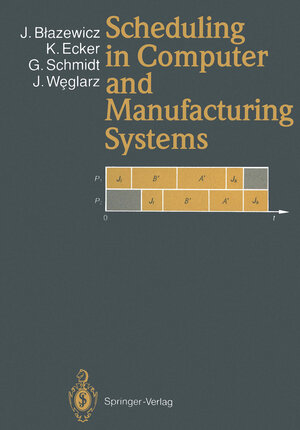
×
![Buchcover ISBN 9783662000748]()
Scheduling in Computer and Manufacturing Systems
von Jacek Blazewicz, Klaus Ecker, Günter Schmidt und Jan WeglarzInhaltsverzeichnis
- 1 Introduction.
- References.
- 2 Preliminaries.
- 2.1 Sets and Relations.
- 2.2 Problems, Algorithms, Complexity.
- 2.3 Graphs and Networks.
- 2.4 Enumerative Methods.
- 2.5 Heuristic and Approximation Algorithms.
- 3 Formulation of Scheduling Problems.
- 3.1 Definition of Scheduling Problems.
- 3.2 Analysis of Scheduling Problems and Algorithms.
- 3.3 Motivations for Deterministic Scheduling Problems.
- 3.4 Classification of Deterministic Scheduling Problems.
- 4 Single Processor Scheduling.
- 4.1 Minimizing Schedule Length.
- 4.2 Minimizing Mean Weighted Flow Time.
- 4.3 Minimizing Due Date Involving Criteria.
- 4.4 Other Criteria.
- 4.5 Minimizing Change-Over Cost.
- 5 Parallel Processor Scheduling.
- 5.1 Minimizing Schedule Length.
- 5.2 Minimizing Mean Flow Time.
- 5.3 Minimizing Due Date Involving Criteria.
- 5.4 Other Models.
- 6 Static Shop Scheduling.
- 6.1 Flow Shop Scheduling.
- 6.2 Open Shop Scheduling.
- 6.3 Job Shop Scheduling.
- 7 Resource Constrained Scheduling.
- 7.1 Classical Model.
- 7.2 Scheduling Multiprocessor Tasks.
- 7.3 Scheduling with Continuous Resources.
- 8 Scheduling in Flexible Manufacturing Systems.
- 8.1 Introductory Remarks.
- 8.2 Scheduling Flexible Flow Shops.
- 8.3 Scheduling Dynamic Job Shops.
- 8.4 Simultaneous Scheduling and Routing in some FMS.
- 9 Knowledge-Based Scheduling.
- 9.1 Scheduling in Computer Integrated Manufacturing.
- 9.2 Solution Approaches Based on Artificial Intelligence.
- 9.3 Integration of Knowledge and Algorithms.


